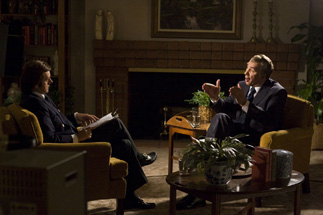Movie Review: Frost/Nixon
By Eric Hughes
December 6, 2008
BoxOfficeProphets.com

Undoubtedly dramatized, the events play out curiously well for a Hollywood movie adaptation. I mean, who doesn't enjoy seeing little guys take down the big dogs? If this weren't true, think of all the sports movies – Hoosiers, Miracle, in a way Cool Runnings – that would've failed to break out had audiences not craved to see the long shot discover unexpected success. Here, we've got one particular brand of loser who lands the interview of a lifetime when Frost outbids the likes of CBS to speak with Nixon. And because of his entertainment TV background, Nixon's people saw the project as an easy way for the former President to pocket a cool $600,000, while at the same time reassemble his tattered public image.
Following the typical sports model, things don't start out so rosy. Frost opts to throw a few hardballs at Nixon right from the start, which Nixon quickly brushes off without much effort. An intimidating force, and with total control of the interview, Nixon proceeds to talk about whatever he wishes (and at great length), leading Frost and his team of investigators – John Birt (Matthew Macfadyen), Bob Zelnick (Oliver Platt) and James Reston Jr. (Sam Rockwell) – to seriously reconsider if they ever truly realized what they'd be up against in the other corner.
For Frost, failure to tame Nixon meant the probable end of his career, since financing the project alone cost the personality all he had, and then some. And losing his TV shows back in England for the extensive time he was putting into the Nixon interviews certainly didn't help matters. For Frost, the Nixon interviews turned into an instance where he either goes big or goes home.
What's interesting about the film is its slow transition from snappy comedy to powerful drama. Of course with a guy like Frost, his entertainment background needs to be played up to make Nixon's confession at the end of the film that much more effective. Enter Frost's band of bumbling researchers – save for Reston Jr. – who spend more time busting each other's chops than considering the gigantic task at hand. However, once the boys understand the project's sizeable difficulty, the silliness shies away. In its place is fiery drama between Frost and Nixon, which exposes the movie's stage roots.
I haven't seen Morgan's original Frost/Nixon play, so you'll find no comparison between the two here. But what I can say is the Universal feature is a respectable adaptation by playwright Morgan, considering the film's extensive character list, scene locations and other elements that simply couldn't have existed onstage. The movie is also presented as a quasi-documentary, in that the main action is repeatedly interrupted by a series of talking heads discussing what we just saw, or are about to see. The technique works, though there are moments at the beginning where it's a bit confusing why the interruptions (coupled with archive footage) is even taking place.
As expected, Sheen and Langella are fantastic in their respective historical portrayals of Frost and Nixon. And why shouldn't they be? Having played their roles twice before (once at the Donmar Warehouse theatre in London, and again a year later at the Bernard B. Jacobs Theatre on Broadway), the actors can by now imitate their counterparts with their eyes closed. Especially Langella, who's so good at playing Nixon it's frightening. It wouldn't surprise me one bit if the 68-year-old nabbed his first Best Actor Oscar in February. He can conveniently place the hardware next to his Tony and Drama Desk Award wins, both which he won for playing Nixon.